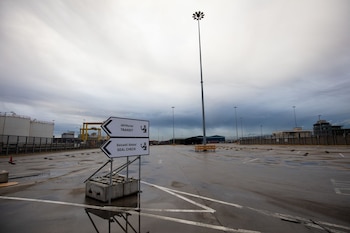
(Bloomberg) -- Northern Irish haulier Stephen McAneney quips that Brexit came close to giving him a heart attack last week.
At McAneney’s Allied Fleet Services, the phone was “ringing off the hook” as customers grappled with a new economic border between Northern Ireland and the rest of the U.K.
“It was just absolute bedlam,” said McAneney, who saw shipments of potatoes, apples and cream destroyed after arriving in Northern Ireland without the right paperwork.
Marks & Spencer Group Plc withdrew about 300 of its products from its Northern Irish stores as the new rules took force, and images of empty food shelves flooded social media. Some demanded the scrapping of the agreement designed to avoid the return of checkpoints in Ireland, known as the protocol.
Fast forward a week, and the teething problems are easing, with shoppers reporting that shelves are filling up again. Yet tensions over the protocol are set to remain a flash point in a deeply divided society.
“There are a lot of people with different agendas who want to portray the protocol as a disaster -- that ranges from Brexit supporters who are anti-protocol to anti-Brexit people,” said Stephen Kelly, head of industry representative group Manufacturing NI. “That’s not the case at this point. We’re not starving.”
The Protocol
After Ireland was divided in 1921, the mainly Protestant north remained in the U.K., separate from the largely Catholic rest of the island. By the 1970s, low-level violence erupted into a full-blown conflict in the north, which left more than 3,500 people dead.
The so-called “Troubles” largely ended with the 1998 Good Friday Peace Agreement. Coupled with Irish and British membership of the European Union, that allowed checkpoints along the 310-mile (500-kilometer) frontier running from near Derry in the north to Dundalk in the south to melt away.
The U.K.’s vote to exit the bloc in 2016 raised the specter of those blocks re-emerging, and potentially threatening the region’s peace process.
Against that backdrop, Britain was forced to concede that it would continue to apply the bloc’s customs rules and regulations in Northern Ireland -- putting a border, in effect, in the Irish Sea as opposed to within Ireland.
Goods at risk of moving into the EU from Great Britain through Northern Ireland face customs checks. The U.K. will also have to make regulatory checks on goods moving into Northern Ireland from the rest of Britain.
How Brexit Deal Resolved Irish Border Stumbling Block: QuickTake
Initial Impact
Once Brexit took hold on Jan. 1, problems sprang up. Some British retailers, such as John Lewis Partnership Plc, decided to halt sales to Northern Ireland while the company “works through the new trading arrangement.”
One trucker rejected 15 loads of food earmarked for the region because it didn’t have the right paperwork, Seamus Leheny, policy manager at Logistics UK in Northern Ireland, told the Ulster Business podcast.
To an extent, Northern Ireland is being caught up in the wider battle British stores are facing exporting to the EU after Brexit, according to Rory O’Connor, who runs Scurri, a software platform connecting retailers to delivery firms. Some 70% of his business comes from the U.K.
“We’ve had a huge amount of inquiries from merchants who just aren’t familiar with the particular new system, and they are just scratching their heads wondering what do they have to do,” said O’Connor. “They are not aware of the requirements, and in a lot of cases, had no idea this was coming at this level or just ignored it.”
Political Reaction
The Democratic Unionist Party, which opposed the protocol from the outset, instantly branded its operation as a disaster and demanded it be scrapped. “We told you so,” said the DUP’s Sammy Wilson.
But the reality is more complicated.
“There have been some occasional empty shelves at some times -- but that’s for a multitude of reasons, not just the protocol,” said Kelly at Manufacturing NI. Other parts of the U.K. also faced supply disruptions due to Covid-related restrictions on travel at British ports at the end of last year.
Food shortages have never been widespread, and shoppers like Patrick Cooper, in Newry, close to the border with the south, had little difficulty in filling their baskets this week.
“The only things they were missing were apple juice and frozen Yorkshire pudding,” said Cooper. “So no trouble there.”
McAneney, the haulier, said the situation has improved this week, as clients adapted, and Kelly said exports from Northern Ireland are flowing smoothly.
Political Football
The protocol, however, is set to remain a source of deep controversy. Unionists say it illustrates the difficulties of treating Northern Ireland differently from the rest of the U.K.
Nationalists defend it as ensuring the border between north and south of Ireland remains open. Any effort to dilute the protocol could fuel their calls for a referendum to unite the north and south of Ireland after a century of partition.
And for at least four years, when the power-sharing assembly gets a vote on the agreement, the protocol is unlikely to go away. U.K. Prime Minister Boris Johnson told lawmakers on Wednesday he’d have no hesitation trying to kill the protocol if the evidence justified it, but dismissed the early disruption as “teething problems.”
There’s no appetite among British or European leaders to revisit the arrangement now, said David Phinnemore, professor of European politics at Queens University Belfast.
“Rejecting the protocol by itself will not solve any problems,” he said. “We need to see how it is really working.”
Últimas Noticias
Debanhi Escobar: they secured the motel where she was found lifeless in a cistern

The oldest person in the world died at the age of 119

Macabre find in CDMX: they left a body bagged and tied in a taxi
The eagles of America will face Manchester City in a duel of legends. Here are the details

Why is it good to bring dogs out to know the world when they are puppies




